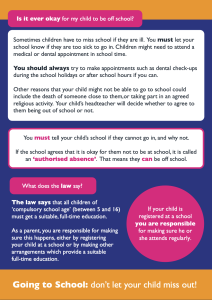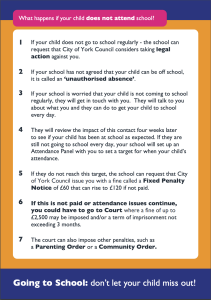- Our school
- Families
- Curriculum
- Current learning
- Latest
- Contact us
Our approach to maintaining good attendance

Promoting and celebrating good attendance
Reducing absence, including persistent and severe absence
Ensuring every pupil has access to the full-time education to which they are entitled
Acting early to address patterns of absence
Building strong relationships with families to ensure pupils have the support in place to attend school
Regular attendance at school is one of the keys to any child achieving their full potential and we try to encourage this at all times at Woodthorpe Primary School.
We work closely with City of York to support students and families, working together to ensure excellent school attendance.
Please do read the Going to School: don’t let your child miss out! leaflet produced by their attendance team that outlines support for families, some useful guidance and advice, and information about the legal framework around school attendance.





In order to improve the overall attendance of pupils in school we aim to:
It is the Head Teacher’s discretion as to whether a child’s absence is recorded as authorised or unauthorised.
Authorised absence:
Unauthorised absence:
Persistent absence (PA):
Codes
There are a series of codes which are used to denote authorised and authorised absence (see ‘Advice on School Attendance’ DFE January 2012).
It is the school’s responsibility to ensure the correct codes are recorded and that patterns and trends in children’s absence are analysed.
Late Pupils
Pupils who arrive before registration closes at 8:50 are marked using the normal ‘/’ code. Pupils arriving after 8:50 but before 9:20 will be marked using the ‘L’ code. Pupils arriving after 9:20 will be marked with the U code which indicates that a child arrived after 9:20 and that this was unauthorised by the school.
Medical appointments
Children will be marked as M for a medical appointment.
Requests for leave of absence
We believe that all children need to be in school for all sessions, so that they can make the most progress possible. For this reason, as a general rule, we do not authorise leave of absence (including holidays) in term time.
The Head Teacher has the discretion to make exceptions to this rule and can authorise leave of absence for special circumstances, when the leave of absence is for no more than 10 days (Using Code H: Family Holiday Agreed). Special circumstances may include:
Service personnel and other employees who are prevented from taking holidays outside term time if the holiday will have minimal disruption to the pupil’s education.
When a family needs to spend time together to support each other during or after a crisis.
Religious Observance
The DCSF recommends the use of Code R when children are absent from school to take part in any day set aside exclusively for religious observance by the religious body to which the parents belong, including religious festivals. Parents should be encouraged to give advance notice.
This is interpreted to mean that if the parent’s religious organisation sets the day as a religious festival then the school must authorise the absence. Where necessary, schools should seek advice from the parent’s religious body about whether it has set the day apart for religious observance.
If the religious body has not set the day apart there is no requirement for the school to approve the absence or grant a leave absence. Additional holidays and days off linked to the religious festival but not “exclusively set aside for religious observance” by the religious body are not marked using Code R.
All members of the school community have roles and responsibilities in promoting and ensuring good attendance and punctuality
Role of the pupils:
Pupils have a responsibility to themselves and others to play a positive role in the life of the school and to make the most of the education opportunities available.
All pupils will:
Role of parents:
Parents have an essential role in ensuring their child’s good attendance.
We ask parents to:
Role of the Class Teacher:
We ask teachers to:
Role of the School:
As a school we:
Role of Governing Body
Under the Education (Pupil Registration) Regulations 1995, the governing body are responsible for making sure the school keeps an attendance register that records which pupils are present at the start of both the morning and the afternoon sessions of the school day. This register will also indicate whether an absence was authorised or unauthorised.
Role of the Local Authority
The Local Authority provides an ‘Advice, Assessment and Early Intervention Service’, frequently referred to as the ‘New Front Door’. The LA may also support the school with legal action to tackle poor attendance where appropriate.
Intervening with Attendance Concerns
Where we have concerns around a pupil’s attendance we may intervene in one or more of the following ways:
The pupil’s attendance will be closely monitored and if there appears to be no improvement the family will be considered for a ‘Termly Fast Track Cycle’.
Year 2 loved meeting Ellie Hendry today who helped out with our rugby triathlon, all in aid of @OscarsCharity.
Thank you @YorkValkyrie and @YorkRLFC for coming to visit! #WPSYSport #WPSYY2
We had a brilliant day joining in for the rugby triathlon and raising money for a such an important charity 🏉 #WPSYSport
We are really proud of our Hockey team for their brilliant participation and teamwork in the tournament on Thursday. Well done everyone involved! 🏑 #WPSYSport #woodthorpecharacter
Reception had lots of fun today finding Easter pictures in our outdoor area. Some of them were really hard to find! Everyone got an Easter treat to say well done for finding them all! Happy Easter everyone! 🐥🐥🐥